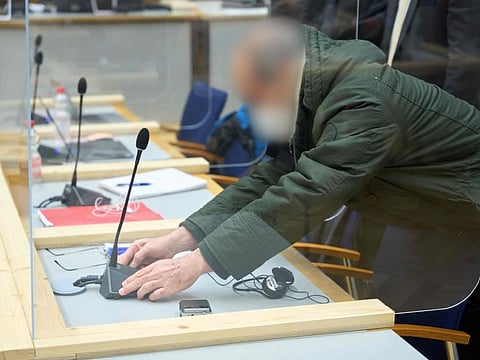Syrian ex-colonel gets life sentence in German torture trial
Raslan, 58, was found guilty of overseeing murder of 27 people

Koblenz, Germany: A German court on Thursday sentenced a former Syrian colonel to life in jail for crimes against humanity in a landmark first global trial over state-sponsored torture in Syria.
Anwar Raslan, 58, was found guilty of overseeing the murder of 27 people at the Al Khatib detention centre in Damascus, also known as “Branch 251”, in 2011 and 2012.
He sought refuge in Germany after deserting the Syrian regime in 2012.
Prosecutors had accused him of overseeing the murder of 58 people and the torture of 4,000 others at the detention centre, but not all of the deaths could be proven.
The defendant, wearing a green winter jacket and listening to the verdict through headphones, remained emotionless as his sentence was read out in court.
More than 80 witnesses, including 12 deserters and many Syrian men and women now living across Europe, took the stand to testify during the trial, with around a dozen also attending the verdict.
The presiding judge said they deserved “full respect”.
Syrian activists gathered outside the court on Thursday holding banners and posters with slogans such as “where are they?” referring to their relatives who have disappeared in Syrian detention centres.
Raslan was put on trial in April 2020 along with another lower-ranking defendant, Eyad Al Gharib, who was accused of helping to arrest protesters and deliver them to the detention centre.
Gharib was sentenced to four and a half years in prison last year for complicity in crimes against humanity.
‘Systematic attack’
The court in the western German city of Koblenz at that time noted a “widespread and systematic attack against the civilian population” since Syria’s civil war began with a brutal crackdown on protests in March 2011.
The case against the two men was brought using the legal principle of universal jurisdiction, which allows offences to be prosecuted even if they were committed in a different country.
Other such cases have also sprung up in Germany, France and Sweden, as Syrians who have sought refuge in Europe turn to the only legal means currently available to them.
In another prominent case in Germany, the trial of a former Syrian doctor charged with crimes against humanity is due to open next week.
The chief prosecutor in the Raslan trial, who has noted Germany’s historical responsibility to judge such crimes, quoted a Holocaust survivor in his closing speech.
Raslan worked for 18 years in the Syrian secret services, where he rose through the ranks to become head of the domestic intelligence “investigation” service, according to a German investigator who testified at the opening of the trial.
Prosecutors say he oversaw rape and sexual abuse, “electric shocks”, beatings with “fists, wires and whips” and “sleep deprivation” at the prison.
Raslan remained silent throughout the trial but said in a statement through his lawyers that he had “neither beaten nor tortured” prisoners and had “never acted inhumanely”.



